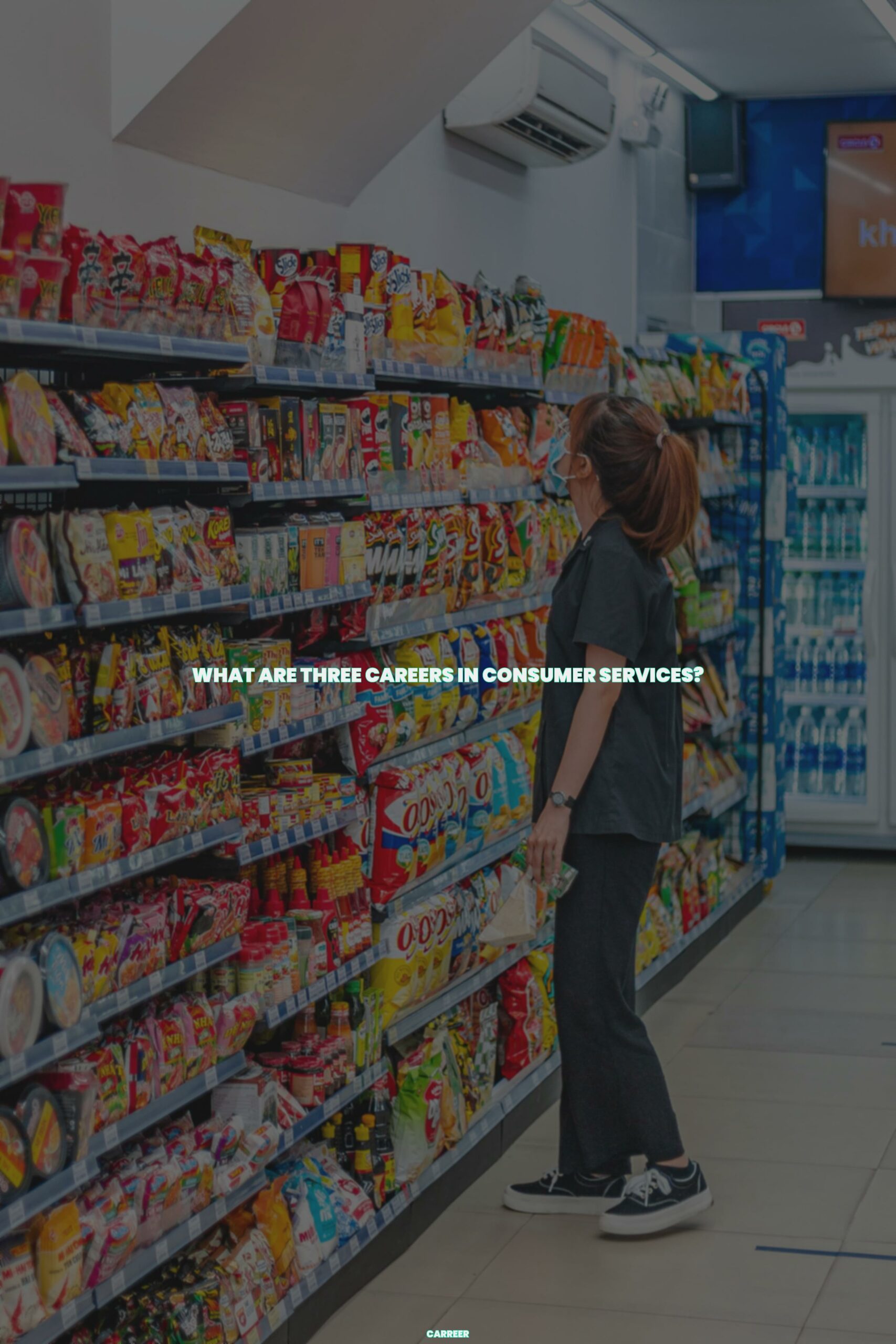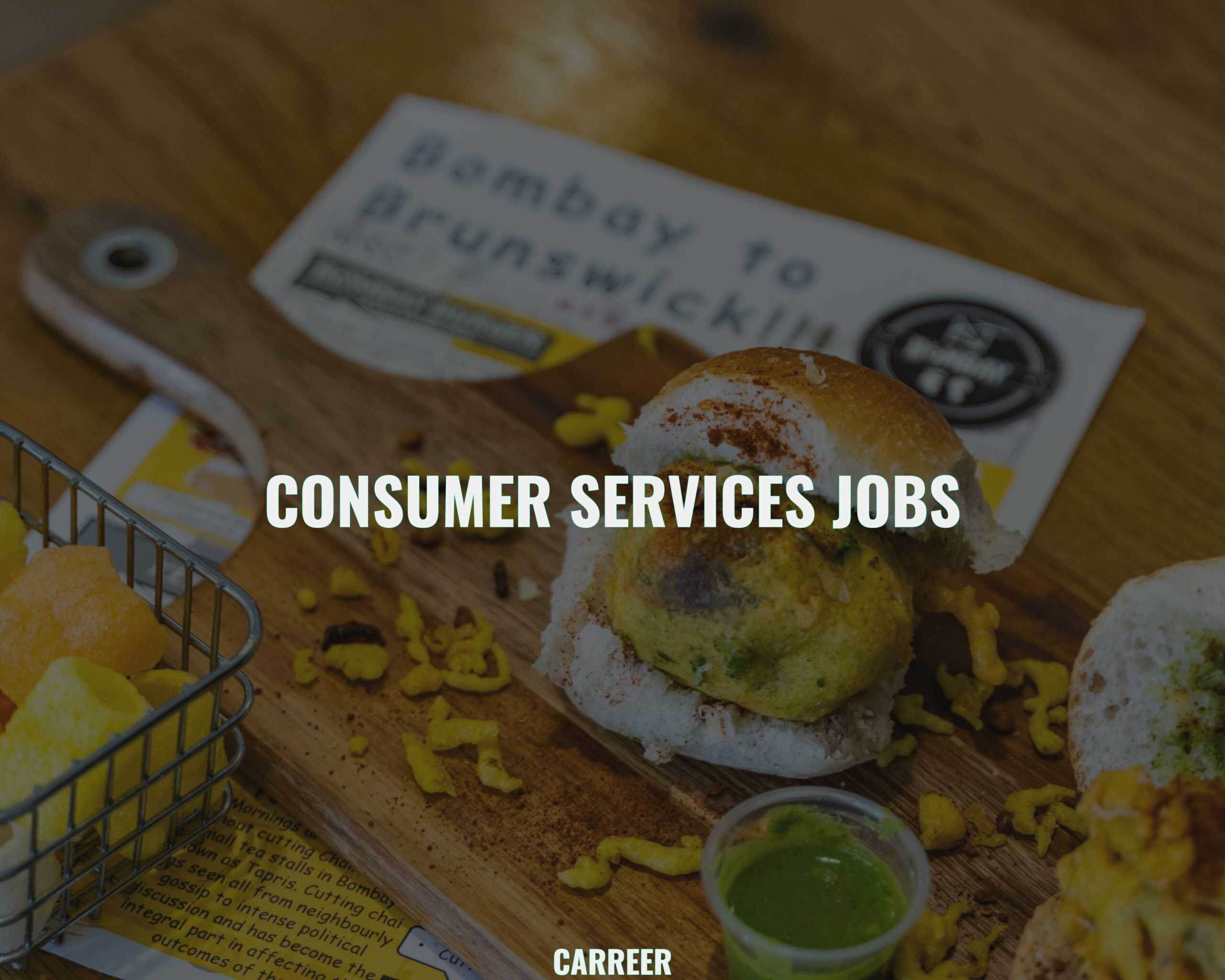Customer Service
What are three careers in consumer services?

Welcome to the world of consumer services! Consumer services encompass a vast array of industries and jobs, from education to health and social services, banking and legal services, and beyond. This growing sector offers limitless opportunities for those who are passionate about providing services to individuals.
Whether you’re a student looking for a career path or an experienced professional considering a career switch, consumer services could be the perfect field for you. From the basics of consumer service to the three types of consumer behavior, this guide will provide you with the information you need to get started.
First, let’s take a look at what consumer services are. Simply put, consumer services are any services provided to an individual or household. This includes everything from leisure and hospitality to consulting services. With total annual revenue of $300 billion and around 455,000 organizations in the U.S., consumer services is a booming industry with a multitude of career options.
Next, let’s take a look at two popular consumer service careers. Health and social services are a major part of the consumer services sector, and they include jobs such as social workers, counselors, and healthcare professionals. Banking and legal services are also a major component of consumer services, and careers in this field could include financial advisors, lawyers, and accountants.
Finally, let’s examine the three types of consumer behavior. Consumers can be classified into three different types: habitual, impulse, and extended decision-making. Habitual consumers usually buy the same products on a regular basis and are not as likely to be influenced by external factors. Impulse consumers tend to make decisions quickly and impulsively, usually based on their emotions. Finally, extended decision-making consumers are more likely to research products before making a purchase, and they may be more influenced by external factors such as advertising or word-of-mouth.
With this information in mind, you can begin to explore the world of consumer services and decide if it’s the right career path for you. From health and social services to banking and legal services, there are a variety of consumer service careers to choose from. So, if you’re looking for an exciting career that offers the opportunity to make a difference in people’s lives, consumer services could be the perfect fit!
What are three careers in consumer services?
Consumer services encompass a variety of industries and jobs. From banking to legal services, there are many different career paths available to those interested in providing services to individuals or households. Three popular consumer services careers are banking, hospitality, and health and social services.
Banking Services
Banking services provide individuals with a variety of financial services, such as accepting deposits, granting loans, and issuing credit cards. Banking professionals work in retail banks, investment banks, and credit unions. They may also work in private banking, corporate finance, or asset management. Banking services also include financial advisors and wealth management consultants.
Leisure and Hospitality Services
Leisure and hospitality services provide customers with experiences, such as entertainment, travel, and dining. Leisure and hospitality professionals may work in the hospitality industry, providing services such as hotel or restaurant management. They may also work in the travel industry, providing services such as tour guiding, flight attendant, or travel agent.
Health and Social Services
Health and social services provide individuals with medical care and social support. Health and social services professionals may work in hospitals, nursing homes, or home care agencies. They may also work in mental health facilities, providing counseling, therapy, or social work services. Other health and social services professionals may work in public health, providing health education or health policy services.
No matter which consumer services career path you choose, you’ll be providing an important service to individuals or households. Whether you’re helping customers manage their finances, creating memorable experiences, or providing social and medical support, you’ll be making a difference in people’s lives. With such a wide variety of career paths available, you’re sure to find a career in consumer services that’s right for you.
What are two consumer service careers?
Consumer service careers are on the rise, with numerous job opportunities available in the field. Working in the service industry, employees focus on helping customers achieve their overall goal. It can be both challenging and rewarding to work in the consumer services sector, as it offers a good deal of flexibility and autonomy.
However, there are some downsides to working in the consumer services sector as well. It can be a demanding job, with long hours and unpredictable schedules. Additionally, customer service representatives and retail salespersons must be able to handle difficult customers in a professional and polite manner.
According to the Bureau of Labor Statistics, customer service representatives and retail salespersons are the two most common occupations in the consumer services sector. Customer service representatives typically work in call centers, assisting customers with their inquiries and complaints. They must be able to quickly and accurately answer customer questions and provide helpful solutions.
Retail salespersons, on the other hand, are responsible for selling products and services to customers. They must be knowledgeable about the products they are selling and be able to answer any questions customers may have. Retail salespersons must also be able to effectively market their products and services to customers.
So, if you’re interested in a career in the consumer services sector, these two occupations should provide plenty of opportunities. Both customer service representatives and retail salespersons must have excellent communication and customer service skills, as well as the ability to handle difficult customers in a professional and polite manner. Additionally, they must be able to work independently and manage their own time.
Overall, working in the consumer services sector can be a great career choice. It offers a good deal of flexibility and autonomy, and it’s a great way to build your customer service and communication skills. So, if you’re looking for a career in the service industry, consider the opportunities available in customer service and retail sales.
What career cluster is consumer services in?
Consumer services is part of the Human Services Cluster, one of five career pathways. This career pathway offers a variety of jobs that help to connect people with needed services and resources, with a focus on providing support and assistance to individuals, families, and communities.
Within this cluster, the consumer services pathway is focused on helping people access the products and services they need. This can include providing advice and guidance, helping to negotiate agreements, and advocating for consumer rights. Examples of jobs in this pathway include Consumer Credit Counselor, Loan Counselor, Consumer Advocate, Customer Service Representative, Employee Benefits Representative, Hospital Patient Account Representative, Market Researcher, Event Specialist, and Inside Sales Representative.
Consumer services professionals often provide advice, guidance, and assistance to help people make informed decisions and access the services they need. They may help people find resources to help them address their financial needs, such as budgeting and debt management, or they may provide advice on selecting the best products and services to meet their needs. They may also help to negotiate agreements and advocate for consumer rights.
In addition to providing advice and guidance, consumer services professionals are often responsible for connecting people with the services and resources they need. This can include helping people apply for government benefits, connecting them with job resources, or helping them access medical services.
Consumer services professionals must have excellent communication skills in order to effectively communicate with their clients and provide them with the best possible service. They must also be able to think critically and creatively in order to find solutions to their clients’ problems.
If you’re interested in a career in consumer services, you’ll need to have strong interpersonal and problem-solving skills, as well as an understanding of consumer rights and regulations. You’ll also need to be familiar with the various consumer services and products available, and be able to assess the needs of your clients in order to provide them with the best possible advice and assistance.
What are the types of customer service field?
Customer service is an essential part of any business’s offering. It helps to create a positive customer experience and ensure customer satisfaction. But what types of customer service should your business offer? This post will outline the most common types of customer services and discuss which one is right for your business.
Walk-in service departments are the traditional form of customer service. This type of service is great for businesses that require face-to-face interactions with customers. It is often used by retail stores, restaurants, and other businesses that need to provide a personal touch. Walk-in service departments can also provide customer service for more complex issues, such as repairs or product returns.
Telephone customer service is another type of customer service. This type of service is great for businesses that need to provide quick and efficient customer service. Customers can call a customer service representative and get help with their issue quickly. Telephone customer service is also great for businesses that don’t have the resources to staff a full-time customer service department.
Online customer service is becoming increasingly popular. This type of customer service is often used by businesses that don’t have the resources to staff a full-time customer service department. It is great for businesses that need to provide customer service to customers who are located in different countries or time zones. Online customer service can also provide customers with help and advice in real-time.
Automated customer service is a type of customer service that is becoming increasingly popular. This type of service uses AI technology to provide customers with quick answers to their questions. Automated customer service can be used to answer basic questions and provide customers with helpful information. It can also be used to provide customers with product recommendations and other personalized services.
Proactive and reactive customer service are two different types of customer service. Proactive customer service is a type of customer service that is focused on helping customers before they have an issue. This type of customer service can be used to provide customers with helpful information and advice before they have a problem. Reactive customer service is a type of customer service that is focused on helping customers after they have an issue. This type of customer service is great for businesses that want to provide customers with quick and efficient help after they have an issue.
Ultimately, the type of customer service you choose for your business will depend on your customers’ needs and the resources you have available. Walk-in service departments are great for businesses that need to provide a personal touch, while telephone customer service is great for businesses that need to provide quick and efficient customer service. Online customer service and automated customer service are great for businesses that don’t have the resources to staff a full-time customer service department. And finally, proactive and reactive customer service are both great options for businesses that want to provide customers with quick and efficient help.
What are the 3 types of consumers?
Organisms that consume other organisms are known as consumers, and they are an essential part of any ecosystem. Consumers can be broken down into three main categories: primary consumers, secondary consumers, and tertiary consumers. Knowing the three types of consumers and how they interact with their environment can help us better understand the natural world.
Primary Consumers: Primary consumers, also known as herbivores, feed directly on plants. Caterpillars, grasshoppers, and hummingbirds are all examples of primary consumers. Primary consumers that only feed on one type of producer are known as specialists, such as the koala that only eats eucalyptus leaves. Those that feed on many types of plants are known as generalists.
Secondary Consumers: These are organisms that feed on primary consumers. Secondary consumers, also known as carnivores, can be further divided into two groups: predators and scavengers. Predators hunt their prey and feed on it, while scavengers consume dead animals. Examples of secondary consumers include foxes and hawks.
Tertiary Consumers: These are consumers that feed on secondary consumers. Tertiary consumers, also known as top predators, can be either carnivores or omnivores. Examples of tertiary consumers include bears, wolves, and humans.
The three types of consumers are an important part of the food chain and help to keep the environment in balance. Without consumers, producers would eventually overpopulate and cause an imbalance in the ecosystem. Knowing the different types of consumers and the roles they play in the environment helps us to better understand our world and how it works.
What are the 3 types of consumer behavior?
Understanding consumer behavior is an essential part of any successful business. Knowing how customers think and act helps companies create better products, better market their offerings, and better adjust to changing customer needs. There are three main types of consumer behavior: socio-psychological, reasoned action, and impulse buying.
Socio-psychological: Thorstein Veblen’s socio-psychological model posits that a consumer’s cultural and social background are some of the primary factors that influence their purchasing behavior. Rather than fulfilling basic needs, consumers are driven by the need to maintain their social status.
Reasoned action: The theory of reasoned action (TRA) states that consumers assess products or services before making a decision. Consumers weigh their options, do research, and make an informed decision. They consider their budget, their personal preferences, and the opinions of friends and family before making a purchase.
Impulse buying: Impulse buying is when a consumer purchases something on a whim. They don’t consider the cost or their budget; instead, they buy something that catches their eye and appeals to their emotions. Impulse buying is often driven by marketing and advertising campaigns that target the emotions of the consumer.
It’s important to remember that all of these types of consumer behavior can coexist. A customer may do research and make an informed decision, but they may also be influenced by their culture and social background. They may also be influenced by marketing campaigns and purchase something on a whim.
Understanding these different types of consumer behavior is essential for businesses to be successful. Companies need to be able to identify the types of behavior that their customers are displaying and adjust their strategies accordingly. They should consider their customers’ backgrounds, their budgets, and the emotions that they are trying to target. By doing so, they can create products and services that better meet the needs of their customers.

Customer Service
What is the highest paid customer service job?

Customer service is a vital part of any business, as it helps ensure customer satisfaction and loyalty. The customer service industry is a competitive one, and those working in the sector must be highly skilled and experienced. But what is the highest paid customer service job?
The answer may surprise you. The best companies pay $18-$20/hr and there are several different customer service jobs that can pay well, depending on the company and the position. Account coordinators, customer service representatives, and concierges are some of the top-paying positions in the customer service industry.
Account coordinators prepare and file contracts, update internal databases, communicate with clients, coordinate meetings, and compile account reports. They can expect to make an average salary of $30,200 to $37,500. Customer service representatives are the first line of customer service, dealing with client queries and complaints on a regular basis. They can make an average salary of $27,000 to $48,000. Concierges perform an important role in customer service, ensuring that clients are satisfied with their services and fielding complaints, making it one of the best-paying customer service jobs available.
For those considering a career in customer service, it’s important to keep in mind that the job can be demanding and require long hours. However, the rewards can be worth it and there are plenty of opportunities to progress and move up in the industry. With the right qualifications and experience, you can move up from customer service to a higher-paying position.
Customer service is a rewarding and challenging career, and if you’re willing to put in the work you can make a career out of it. Knowing which customer service jobs pay the best can help you make the decision to pursue a career in the industry. With the right qualifications and experience, you can make a successful career out of customer service.
What is the highest paid customer service job?
Customer service jobs can be both rewarding and lucrative. The highest paid customer service jobs typically require specialized skills, knowledge and experience. Companies that offer the highest salaries for customer service roles are often looking for candidates who have a passion for customer service and are willing to go the extra mile to ensure customer satisfaction.
Account Coordinator: Account coordinators are the highest paid customer service jobs. They work for places such as marketing agencies or public relations firms, preparing and filing contracts, updating internal databases, communicating with clients, coordinating meetings, and compiling account reports. Account coordinators typically earn an average salary of $30,200 to $37,500.
Customer Service Representative: Customer service representatives are the first line of customer service, dealing with client queries and complaints on a regular basis. They are also responsible for fixing any problems that customers may have. On average, customer service representatives earn between $27,000 to $48,000.
Concierge: Concierges are among the highest paid customer service jobs. This role works to ensure clients are satisfied with their services, fields complaints, answers questions, and may manage a team of client service representatives. Concierges typically earn an average salary of $45,000 to $85,000.
Technical Support Specialist: Technical support specialists provide customer service to clients who require assistance with technical products and services. Technical support specialists may be responsible for diagnosing and resolving technical issues, maintaining customer accounts, and providing technical support over the phone or online. Technical support specialists typically earn an average salary of $40,000 to $60,000.
Call Center Supervisor: Call center supervisors supervise and manage customer service representatives. They typically have a customer service background and have experience in call center operations. Call center supervisors are responsible for ensuring customer service representatives are meeting company goals and standards, and they are also responsible for customer service training and coaching. Call center supervisors typically earn an average salary of $45,000 to $60,000.
No matter which customer service job you choose, it’s important to remember that customer service jobs are not just about providing customer service; they are also about building relationships, developing communication and problem-solving skills, and creating an overall positive customer experience. With the right skills and experience, customer service jobs can be a great way to earn a good salary.
What is the next job after customer service?
Customer service professionals are a valuable asset to any business, as they are the ones responsible for ensuring customer satisfaction before, during, and after the purchase of a product or service. But what happens when a customer service representative decides to move on from the field? What jobs do they typically transition into?
Customer Retention Specialists are a great option for customer service professionals who are looking to move on from their role. This job requires them to provide proactive support to customers to help them get the most out of their product, with the aim of increasing customer loyalty and driving repeat business.
Customer Experience Managers are responsible for managing and improving the customer experience in order to increase customer satisfaction. They are also tasked with developing strategies to help ensure customer retention and loyalty. This job is perfect for those who have a strong understanding of customer service and possess excellent communication and problem-solving skills.
Customer Care Representatives are responsible for managing customer queries and complaints, and for providing resolutions in a timely manner. This role requires excellent customer service skills, as well as a thorough understanding of the company’s policies and procedures. It’s also important for customer care representatives to have a good understanding of the company’s products and services.
Technical Support Representatives are responsible for providing technical support to customers. They are tasked with troubleshooting technical issues and providing solutions, as well as helping customers with their software or hardware needs. Technical support representatives must have strong problem-solving and analytical skills, as well as a good understanding of the company’s products and services.
Marketing Specialists are responsible for developing and executing marketing campaigns that are aimed at increasing customer awareness and engagement. This job requires strong communication and organizational skills, as well as a good understanding of the company’s products and services.
Sales Representatives are responsible for selling products and services to customers. This job requires excellent communication and customer service skills, as well as a thorough understanding of the company’s products and services.
These are just some of the jobs that customer service professionals can transition into after leaving the field. To choose the best option for you, it’s important to consider your skills, interests, and experience. With the right job, you can make the most of your customer service skills and have a successful career.
Is a career in customer service worth it?
If you’re looking for a career that puts you in a position to deliver memorable and authentic experiences, look no further than customer service. Not only is it a rewarding profession, but it also allows you to genuinely help make people’s lives better.
Customer service jobs are in high demand and are expected to continue to grow. This means you have more options than ever before to research the role you want and uncover the best choice of employer — one who values your unique talents and aspirations.
When it comes to the rewards of a customer service career, there are many. You get the chance to build meaningful relationships with customers, to hear their stories and to help them get what they need. You also have the opportunity to be the face of the company and to show customers you care about their experience.
Additionally, working in customer service can help you develop valuable skills, such as problem-solving, conflict resolution, and communication. This means you can use your customer service experience to progress in your career and get a better job in the future.
However, a career in customer service can be tough. You will likely encounter difficult customers, long hours and challenging situations. But, with the right attitude and determination, these challenges can be overcome.
If you’re looking for a customer service career, Robert Half can help. We specialize in helping people find the best job opportunities and connect with employers who value their skills and aspirations. With our expertise, you can find the perfect role that suits your professional goals.
Ultimately, a career in customer service can be immensely rewarding. If you’re prepared for the challenges and ready to put in the work, you’ll be in a great position to make a positive impact on people’s lives and to develop your skills. So, if you’re looking for a career with real rewards, customer service could be the perfect choice for you.
How do I move up from customer service?
Customer service is a valuable starting point for many career paths, and many companies now require new employees to spend time in this role. But why move up from customer service? It’s an excellent way to gain an understanding of your business and its customers, as well as to build relationships with them. However, it doesn’t guarantee a path to another part of the company.
So, what can you do to make a successful transition from customer service to another role? The first step is to make it known that you have an intention to pivot. You can do this by speaking to your manager or supervisor and letting them know your goals. This will help them understand your career trajectory and provide you with the guidance and support you need.
Once you’ve made your intentions clear, the next step is to learn what you need to do to make a successful transition. This could include taking additional courses, gaining certifications, or finding mentors who can help you develop the skills needed for the new role. Additionally, you should look for opportunities to demonstrate your leadership and problem-solving skills. For example, if you’re looking to move into a managerial position, you can take on additional responsibilities or suggest solutions to common customer service issues.
Finally, remember that it’s ok to stay in customer service if you love it. Even if you don’t see a direct path to another role, there are still ways to grow and develop. You can ask for additional training or take on additional responsibilities to increase your skills and knowledge. Additionally, you can network with other customer service professionals to stay up to date on industry trends and find out about new opportunities.
In conclusion, customer service is an excellent starting point for many career paths, but it doesn’t guarantee a path to another area of the company. To make a successful transition, it’s important to make your intentions clear, learn what skills you need to develop, and showcase your leadership and problem-solving skills. Lastly, don’t forget that if you love customer service, it’s ok to stay in it. There are still ways to grow and develop even if you don’t see a direct path to another role.
Where can I go after customer service job?
For those looking to move beyond their customer service job, there are plenty of options. Customer service is a great platform to learn how to interact with customers, identify their needs, and develop problem-solving skills. It can also open the door to many other positions within a company.
Customer service agent
A customer service agent or a customer service representative is the first role that opens doors to the customer support space. In this role, agents are on the frontline of customer support and spend most of their time solving customer questions. Customer service agents need to have excellent communication skills, be able to think on their feet, and have the ability to quickly identify and resolve customer issues.
Open the door to operations
Customer service, at its core, is part of overall company operations. Agents are using company systems all day, hopping in and out of accounts, making changes, tracking packages, hearing about warehouse picking mistakes, seeing reasons for credit card declines, and so on. This experience can be invaluable when transitioning to a more operations-focused role. Agents can bring their customer service experience to the table and use their understanding of how customer service works to help inform operations decisions.
Step into the world of product management
Product management is a great option for those looking to move beyond customer service. Product managers are responsible for making sure the product meets customer needs and is successful in the market. Product managers need to have a deep understanding of customer needs, market trends, and a keen eye for detail. A customer service background can be an asset to a product manager role, as understanding customer needs and having an understanding of how customer service works can be invaluable in the role.
Lead the customer service team
For those that are interested in a leadership role, customer service management is a great option. Customer service managers are responsible for overseeing the customer service team, ensuring customer satisfaction, and driving customer service initiatives. They need to have a deep understanding of customer service, be able to manage a team, and have the ability to think strategically. Customer service agents can use their experience with customer service to help them transition into a customer service management role.
Move up the corporate ladder
Customer service agents can also use their experience to move up the corporate ladder. Agents have a lot of insight into how the customer service team works, and can use this insight to help inform decisions at higher levels of the company. With the right combination of experience and a willingness to learn, customer service agents can transition into higher-level roles, such as project management, operations, or even executive positions.
Customer service is a great platform to learn and grow, and it can open the door to many other positions within a company. With the right experience and the willingness to learn, customer service agents can use their experience to transition into other roles and move up the corporate ladder.
Can you make a career out of customer service?
Customer service is an essential part of any business, but it’s often overlooked. It’s easy to focus on the technical aspects of a customer service role, such as technical knowledge or product understanding. However, there are so many more opportunities for those who have excellent soft skills like communication, relationship-building, and problem-solving.
If you’re someone who loves engaging with customers and helping them get the most out of their products and services, a career in customer service can be incredibly rewarding. To help you map out your future, here are six customer service career paths that can help you grow.
1. Customer Service Jobs: If you’re just starting out in customer service, it’s helpful to have some general job titles to help narrow your search. The job titles below offer work flexibility, including remote, part-time, and alternative schedule options.
- Customer Service Representative
- Customer Support Specialist
- Customer Care Professional
- Customer Experience Manager
- Customer Service Manager
2. Technical Support Roles: If you have a technical background, you may be interested in exploring technical support roles. These roles involve helping customers troubleshoot and resolve technical issues. Technical support roles require strong problem-solving skills, as well as an understanding of the product or service being supported.
3. Quality Assurance Roles: Quality assurance roles involve ensuring customer satisfaction and providing feedback to the company to improve customer experience. Quality assurance roles require an understanding of customer service processes, as well as an ability to analyze customer feedback and make recommendations.
4. People Leadership Roles: If you’re looking for a more senior role, people leadership roles in customer service might be a good fit. These roles involve managing a team of customer service representatives and ensuring that customer service goals are met. People leadership roles require excellent communication and management skills.
5. Training and Development Roles: Training and development roles involve designing and delivering customer service training programs. These roles require a deep understanding of customer service processes and the ability to create engaging training programs.
6. Consultant Roles: Consultants are often hired to work with companies to help them improve their customer service processes. Consultants need to have a thorough understanding of customer service strategies and an ability to develop long-term solutions for customer service challenges.
These are just a few of the many customer service career paths you can explore. With a little bit of hard work and dedication, you can find a role that suits your skills and interests. With the right approach, you can make a successful career out of customer service.
Customer Service
Onsumer services a good career path

A career in customer service can be a great choice for those looking to make a difference in their customers’ lives. From restaurants to retail stores, customer service is essential in providing excellent customer experiences. As the retail industry continues to evolve, customer service roles are becoming more complex, offering job seekers a wide range of opportunities to explore. Not only do customer service jobs provide a steady income, but they also offer great career advancement opportunities.
If you’re considering a career in customer service, you may be wondering if it’s worth the effort and if customer service is a good paying job. You may also be curious about the future of customer service and what the next job after customer service might be. It’s important to understand the career prospects of customer service to determine if it is a good fit for you.
The answer is yes—customer service is a great career path. Not only can you make a good living in the customer service industry, but you can also have plenty of opportunities for growth and development. With the right skills and experience, customer service professionals can move into more specialized roles, such as customer experience manager or customer care director. With additional training and education, customers service professionals can also find plenty of opportunities to advance their careers.
Overall, customer service is a great career path for those looking to make a difference in their customers’ lives. With a steady income and career advancement opportunities, customer service can be a great way to develop your professional skills. So, if you’re ready to take the next step in your career, customer service may be the perfect fit for you.
Onsumer services a good career path
Consumer services is a rapidly growing industry that offers a variety of opportunities for career advancement. With the right skills and experience, those in the consumer services field can move into supervisory positions or take on managerial roles, allowing them to gain more responsibility and higher pay. Additionally, with additional training and education, consumer services professionals may be able to move into more specialized roles such as customer experience manager or customer care director.
The consumer services industry is a great option for those looking for a career with growth potential. With the right experience and qualifications, a consumer services professional can open up new opportunities for career advancement. Consumer services professionals with the right skills and experience can move into supervisory positions or take on managerial roles, allowing them to take on more responsibility and higher pay.
Those in the consumer services industry may also be able to gain specialized knowledge and experience in areas such as customer experience management, customer service, customer relations, or customer care. With this knowledge and experience, consumer services professionals can move up the ladder and into more specialized roles such as customer experience manager or customer care director. These positions often involve more responsibility and higher pay.
In addition to the career advancement opportunities available in the consumer services industry, there are also many other benefits. Consumer services professionals are often highly valued by employers and can find many job openings in their area. The consumer services industry is also an excellent choice for those looking to gain new skills and experience. With the right qualifications and experience, consumer services professionals can find plenty of opportunities to advance their careers.
Finally, the consumer services industry is a great option for those looking to gain valuable experience in customer service, customer relations, and customer care. With the right qualifications and experience, consumer services professionals can gain the skills and experience necessary to move into more specialized roles such as customer experience manager or customer care director.
If you are interested in learning more about the career opportunities available in the consumer services industry, check out our career path page. Here you can find out more about the different career paths available in the consumer services industry, as well as helpful tips for those looking to move up the ladder. Additionally, you can read our article on career trajectory to learn more about the various career paths available in the consumer services industry.
Consumer services is a great choice for those looking to gain valuable experience and skills while also advancing their career. With the right qualifications and experience, consumer services professionals can find plenty of opportunities to move up the ladder and into more specialized roles. So, if you are looking for a career with growth potential, the consumer services industry could be a great choice for you.
Is a career in customer service worth it?
Customer service is a challenging but rewarding career path. It requires strong communication skills, empathy, and a positive outlook, but the rewards of helping people and being the face of a company can be worth it.
For starters, customer service jobs usually come with competitive salaries. Most companies offer a base salary, plus bonuses or commission-based schemes for meeting certain goals. Plus, many customer service roles offer great job security and potential for career growth.
But what makes customer service so rewarding is that you can make a real difference in people’s lives. You’ll be responsible for solving a range of customer issues, from answering questions to resolving customer complaints. You’ll be the one that customers turn to when they’re in need, and it can be incredibly gratifying to be able to help people in this way.
If you’re considering a career in customer service, you’ll need to possess certain skills. You’ll need to be an excellent communicator, both verbally and in writing, and you’ll need to be able to think on your feet and problem solve. You’ll also need to be patient, understanding, and have the ability to stay calm in difficult situations.
Additionally, customer service jobs require excellent organizational skills. You need to be able to prioritize tasks and handle multiple tasks at once. You’ll also need to be comfortable using different software and technology, as most customer service jobs require some proficiency with computers.
In terms of career growth, customer service jobs can provide a great foundation for furthering your career. Many customer service employees have gone on to become managers or take on other leadership roles.
Overall, a career in customer service can be rewarding and challenging. It requires a special set of skills and the ability to stay calm in stressful situations. But if you enjoy helping other people and are a natural communicator, it can be a great career path. And, with competitive salaries and potential for career growth, it can be worth it.
Ready to take the plunge and pursue a career in customer service? Check out our guide to customer service career paths for more information on the skills you need, what customer service jobs typically pay, and how to get started.
Is customer service a good paying job?
Customer service roles are an important part of every thriving business in any industry. If you’re looking for a job that pays well, customer service might be the perfect fit. With the right skills, knowledge and experience, you can find customer service jobs that pay more than you might think. In this article, we’ll highlight some of the best-paying customer service jobs that you should consider.
How to Find the Best Paying Customer Service Jobs
When it comes to finding the best paying customer service jobs, one thing to keep in mind is that job titles are often in flux. It used to be that you’d have a customer service representative and maybe a manager, but now these roles have evolved to include more digital customer service roles such as virtual customer service agents.
To find the best paying customer service jobs, you’ll want to research the different customer service roles available and the salaries associated with them. You can also take a look at job postings to see what employers are offering for the roles you’re interested in. It’s important to note that salaries can vary depending on experience, location, and the industry you’re in.
Customer Service Manager
A customer service manager is responsible for ensuring clients are satisfied with their services, fielding complaints, answering questions, and managing a team of client service representatives. This is one of the best-paying customer service jobs out there, with the average U.S. salary ranging from $58,000 to $100,000 per year. Companies that hire customer service managers include Amazon, Walmart, and Apple.
Customer Support Specialist
Customer support specialists are responsible for providing technical support to customers. They must be able to troubleshoot customer issues, answer customer questions, and provide helpful solutions. Customer support specialists typically earn an average of $50,000 per year. Companies that hire customer support specialists include Microsoft, Dell, and HP.
Technical Support Representative
Technical support representatives are responsible for providing technical assistance to customers. They must be able to troubleshoot customer issues, answer customer questions, and provide helpful solutions. Technical support representatives typically earn an average of $45,000 per year. Companies that hire technical support representatives include IBM, Oracle, and Adobe.
Customer Service Representative
Customer service representatives are responsible for providing customer service to clients. They must be able to answer customer questions, respond to customer complaints, and provide helpful solutions. Customer service representatives typically earn an average of $35,000 per year. Companies that hire customer service representatives include AT&T, Verizon, and Comcast.
In conclusion, customer service jobs can be a great way to earn a good salary. With the right skills, knowledge and experience, you can find customer service jobs that pay more than you might think. Take some time to research the different customer service roles available, and compare salaries to find the best paying customer service job for you.
Does customer service have future?
Customer service has come a long way since the days of waiting in long lines at the store, and it will continue to evolve in the future. As customer expectations and technology advances, customer service is becoming a more important part of the customer experience. Today, customers are looking for more than just a good product or service; they are looking for an experience that is tailored to their needs and delivered in a timely manner.
The future of customer service starts with learning what customers expect today: a consistent and empathetic connected experience. Companies that can offer this type of service will be in a better position to meet customer demands and retain customers long-term. The catch? Challenging economic conditions mean that organizations should focus on cost efficiency and service productivity. Balancing this with evolving customer expectations makes issues like data silos and disconnected service channels more urgent to solve quickly.
To stay competitive in the future, companies must embrace the latest customer service trends. Automation and artificial intelligence are becoming increasingly important in customer service, as they can help to reduce costs and improve customer satisfaction. Automation can help to streamline processes and reduce the need for customer service representatives, while AI can provide more personalized and targeted customer service.
Another important trend in the future of customer service is data-driven customer service. By leveraging customer data from multiple sources, companies can provide more personalized and relevant customer service experiences. Companies can use data to better understand their customers and provide more tailored customer service experiences.
Improving your customer service to gain a more complete view of the customer journey can help you save time and money by eliminating costly, inefficient processes. With a streamlined approach, your agents can focus their valuable time on delivering better customer service. Companies should also focus on creating seamless customer experiences across all channels for customers to interact with. This will help to create a more consistent and efficient customer service experience.
Finally, customer service must continue to evolve to meet customer expectations. Companies must stay up to date on the latest trends and technologies to ensure they are providing the best customer service possible. Investing in the right customer service technologies and training your team to use them can help your customer service team stay ahead of the curve.
The future of customer service is an exciting one, and one that will require companies to stay ahead of the curve and invest in the right customer service technologies. Automation, artificial intelligence, and data-driven customer service are all essential elements of customer service today and will be even more important in the future. With the right approach, companies can create a customer service experience that is both efficient and tailored to the customer’s needs.
What is the next job after customer service?
Customer service is an important role in any business, as it helps to create and maintain customer relationships. It is also a great starting point for those looking to enter the customer service industry. After gaining experience in customer service, many individuals look to find the next job in their career path.
What is Customer Service? Customer service is the process of assisting customers before, during, and after the purchase of a product or service. Customer service professionals must have excellent communication skills and be knowledgeable about the products and services they are providing. The goal of customer service is to ensure customers are satisfied with their purchase and to help them with any issues they may have.
Typical Career Path in Customer Service A typical career path for customer service includes starting out as a customer service agent or representative. In this role, agents are on the frontline of customer support and spend most of their time-solving customer questions. After gaining experience in this role, customer service professionals may choose to pursue other customer service roles such as a customer service manager or supervisor.
Common Job Titles in Customer Service There are a variety of job titles within the customer service industry. These include customer service agent, customer service representative, customer service manager, customer service supervisor, customer service specialist, and customer service analyst. Depending on the company, individuals may also hold positions such as customer success manager, customer experience manager, and customer service director.
Benefits of Working in Customer Service Working in customer service can be a rewarding and fulfilling experience. It can provide an opportunity to build relationships with customers, learn new skills, and develop problem-solving abilities. Additionally, customer service professionals often have the opportunity to work flexible hours and in a variety of settings.
For those who have experience in customer service, there are a number of career opportunities available. Individuals may choose to pursue roles such as customer service manager, customer success manager, customer experience manager, customer service director, customer service specialist, or customer service analyst. These positions require strong customer service skills, as well as the ability to develop relationships with customers and manage customer service teams.
In conclusion, customer service is a great starting point for those looking to enter the customer service industry. After gaining experience in customer service, individuals can pursue a variety of job titles and positions. With the right skills and experience, customer service professionals can build successful and fulfilling careers.
Can you make a lot of money in customer service?
Customer service is an important job that requires individuals to have a certain set of skills and a certain level of commitment to their work. Unfortunately, the pay for customer service jobs is often less than desirable. The median salary for a customer service representative is $34,710, and the top 25% of earners only make $43,980. This means that the majority of customer service representatives make much less than that.
However, while customer service may not be the most lucrative career choice, it is possible to make a decent salary in customer service. Depending on the industry and the company that you work for, you may be able to make a good living. Here are some of the highest-paid customer service positions:
Bank Tellers: Bank tellers are the face of a bank. They are responsible for handling customer transactions, such as deposits and withdrawals, cashing checks, and issuing loans. Bank tellers must be able to accurately handle money and have excellent customer service skills. The average salary for bank tellers is $30,200 to $37,500.
Customer Service Representatives: Customer service representatives are the first line of customer service, dealing with client queries and complaints on a regular basis. They are also responsible for fixing any problems that customers may have. The average salary for customer service representatives is $27,000 to $48,000.
Concierges: Concierges perform an important function in customer service. They are responsible for providing assistance to customers and helping them find the services that they need. The average salary for a concierge is $26,000 to $41,000.
While these jobs may pay more than other customer service positions, they are still not considered to be high-paying jobs. The good news is that there are opportunities to make more money in customer service. Many companies offer bonuses and incentives for customer service representatives who go above and beyond in their work. Additionally, some companies may offer a higher salary for customer service representatives who have a certain level of experience or training.
Overall, customer service is not a job that is known for its high salaries. However, if you have the right skills and dedication, it is possible to make a decent living in customer service. With the right attitude and the right opportunities, you can make more money in customer service.
Customer Service
Consumer services jobs

Consumer services are an integral part of any business. They are the people who help customers get the best out of their products or services. The importance of these services should never be underestimated.
Customer service is a broad term that covers a wide range of tasks, from answering questions to resolving issues and providing customer assistance. It is the first point of contact between the customer and the company, and is the bridge between customer and business.
When it comes to consumer services, there are four main types. These include customer service, sales and marketing, technical support, and customer relations. Customer service is responsible for providing customers with assistance and resolving their issues. Sales and marketing focus on promoting products and services to customers and helping them make informed decisions. Technical support helps customers with any technical issues they may have. Finally, customer relations are responsible for building relationships with customers and ensuring their satisfaction.
Examples of consumer services include customer service representatives, customer experience specialists, customer service managers, customer service technicians, and customer relations specialists. These professionals are responsible for a variety of tasks, from dealing with customer issues to ensuring customer satisfaction.
There are also seven types of customers that consumer services need to be aware of. These include individuals, businesses, government agencies, non-profit organizations, foreign customers, online customers, and customers with special needs. Each customer type has different needs and preferences, and consumer services need to be able to adjust to each one accordingly.
Finally, customer service jobs require a wide range of skills and abilities. Professionals need to have excellent communication and problem-solving skills, as well as a good understanding of customer service processes. They also need to be patient and able to multi-task, as customers often require a quick response.
Consumer services and customer service are two distinct, but related, fields. Customer service is the more general term, while consumer services are more focused on providing customer assistance and resolving customer issues. Therefore, while customer service is essential to any business, consumer services is the backbone of customer satisfaction.
Consumer services jobs
A customer service job is a great way to build up your skills and help customers at the same time. It requires patience, excellent communication, and problem-solving skills.
Customer service representatives interact with customers to provide information in response to inquiries about products and services, handle and resolve customer complaints, and process orders. They also provide support for customers using the company’s products or services.
In Singapore, there are many customer service jobs available. For example, Retail Sales Executives are responsible for ensuring excellent service standards and maintaining high customer satisfaction. They must have experience in fashion, retail, or customer service.
Referral services are also offered at many practices. This includes ultrasound, x-rays, and other medical procedures. The customer service representative must be able to explain the procedure to customers and answer any questions they may have.
When looking for customer service jobs, it is important to search Glassdoor for job postings that match your skills and experience. Popular searches include client success rep, client relations specialist, dispatch, client success representative, customer care professional, customer manager, inside sales representative, customer care associate, collector, and call center agent.
When applying for a customer service job, it is important to demonstrate your customer service skills. Employers usually look for applicants with a minimum high school diploma and one year of working experience in health related industries and/or customer service. This could include handling new and existing customers’ appointment bookings, attending to walk-in customers at the outlet, and providing support for customers using the company’s products or services.
Customer service jobs are a great way to build up your skills, help customers, and make a positive impact on the company. When looking for a customer service job, it is important to search Glassdoor for job postings that match your skills and experience. Be sure to demonstrate your customer service skills when applying for a job. With the right skills, experience, and attitude, you can find success in a customer service job.
What are the 4 main types of consumer services?
Consumer services are any services that are provided to benefit consumers rather than businesses. They are intangible, perishable and cannot be replaced. They include services such as haircuts, legal advice, or medical care. There are four main types of consumer services: personal selling, advertising, public relations, and direct marketing.
Personal Selling is a type of consumer service that involves direct interaction between a seller and potential buyers. This type of service is used to persuade customers to purchase a product or service. Personal selling is often used when targeting specific consumers or when introducing a new product to the market. This type of service is also used to provide customers with additional information about a product or service.
Advertising is another type of consumer service that is used to promote products and services. This type of service involves the use of various media outlets, such as television, radio, print, and online, to reach a wide range of consumers. Advertising can be used to create brand awareness, introduce new products, and increase sales.
Public Relations is a type of consumer service that focuses on creating and maintaining a positive image of a company or product. This type of service includes activities such as press releases, media campaigns, and public appearances. Public relations services are used to build relationships with customers, engage with potential customers, and create a positive public image for a company or product.
Direct Marketing is a type of consumer service that involves targeting and communicating directly with customers. This type of service includes activities such as direct mail, email campaigns, and telemarketing. Direct marketing is used to build relationships with existing customers and to introduce new products to potential customers.
Consumer services are an integral part of any business. They provide customers with convenience, comfort, and cost savings. By understanding the four main types of consumer services, businesses can better target their audience and provide the best customer service possible.
What are examples of consumer services?
Consumer services are services that provide value to individuals, rather than organizations. They are intangible, meaning they cannot be seen, touched, or held and are usually perishable, meaning they cannot be stored for future use. These services are a large part of the global economy and are often a common business model.
Examples of consumer services include haircuts, legal advice, and financial advice. Other common consumer services include educational services, such as tutoring, language classes, and online courses. Other services include healthcare services, such as massage and physical therapy, as well as entertainment services, such as movie tickets and streaming services.
Personal selling is one of the most common ways businesses market their consumer services. Businesses use personal selling to build relationships with their customers and provide information about their services. This includes face-to-face meetings, phone calls, email campaigns, and other direct communication.
Advertising is another common method of marketing consumer services. Businesses use advertising to reach a wide audience and persuade them to buy their services. This includes radio, TV, print, and digital ads.
Public relations is another marketing method businesses use to promote their services. This includes press releases, media interviews, and other activities that help build a positive reputation for the business.
Key differences between consumer services and consumer goods include the fact that services are intangible, perishable, and cannot be replaced. Consumer goods, on the other hand, are tangible and can be stored for future use. Additionally, the value of a service is derived from the experience, result, or process, rather than a physical object.
In conclusion, consumer services are services that are primarily sold to individuals as opposed to organizations. They are intangible, perishable, and cannot be replaced. Businesses use a variety of marketing methods to promote their services, including personal selling, advertising, and public relations. It is important to understand the key differences between consumer services and consumer goods when deciding which type of product or service to offer.
What are the 7 types of consumers?
Understanding the different types of consumers is essential for any business that wants to succeed in the modern marketplace. Consumers vary in their needs, preferences, and behaviors, so knowing the different types of consumers can help you better target your marketing strategies and products.
The seven main types of consumers are: commercial consumers, retail consumers, industrial consumers, public sector consumers, voluntary sector consumers, individual consumers, and international consumers. Each type of consumer has its own unique needs and preferences, so it’s important to understand them in order to best meet the needs of your customers.
Commercial Consumers are the businesses that buy goods or services for use in their own operations. These businesses can range from large corporations to small businesses. They usually buy in bulk, and may even negotiate prices with suppliers. They are often the biggest and most important consumers in the market, and their decisions can affect the entire economy.
Retail Consumers are individual customers who buy goods or services for their own personal use. These consumers come in all shapes and sizes, from students to retirees. They purchase a variety of products and services, from groceries to electronics.
Industrial Consumers are businesses that buy goods or services for use in their own production processes, such as manufacturers and construction companies. These consumers are usually looking for the best deals and may even negotiate prices with their suppliers.
Public Sector Consumers are government agencies, such as schools and hospitals, that buy goods or services for use in their operations. These consumers usually have large budgets and are very influential in the market.
Voluntary Sector Consumers are non-profit organizations that buy goods or services for use in their operations. These organizations often rely on donations and grants and are usually looking for the best deals.
Individual Consumers are individuals who buy goods or services for their own personal use. These consumers typically buy in small quantities and may be influenced by factors such as price, convenience, and trends.
International Consumers are consumers from outside the country who buy goods or services from within the country. These consumers may be influenced by different factors, such as cultural differences, exchange rates, and the availability of goods and services.
Understanding the different types of consumers is essential for any business that wants to succeed in the modern marketplace. Knowing the needs, preferences, and behaviors of each type of consumer can help you better target your marketing strategies and products to meet their needs. With the right strategies and products in place, you can increase customer loyalty and grow your business.
Who works in customer service?
Customer service representatives (CSRs) are responsible for providing quality customer service and support to customers who have complaints, orders, or require information about products/services purchased from an organization. They are the primary point of contact between customers and the company.
The duties and responsibilities of a customer service representative vary depending on the company and the type of customer service they provide. Generally speaking, CSRs are responsible for managing incoming calls and customer service inquiries, generating sales leads that develop into new customers, and identifying and assessing customer needs. In addition, they may be responsible for providing technical assistance, troubleshooting customer issues, resolving customer complaints, and providing customer support.
CSRs work in a variety of settings, from retail stores to call centers. In most cases, CSRs work on a small team under the direction of a customer service manager. The manager is responsible for overseeing the operations of the team and making sure that customer service goals are met.
To be successful in customer service, CSRs must possess strong communication skills and an understanding of customer service principles and practices. They must also be able to think on their feet and quickly solve customer issues. In addition, CSRs should be familiar with the company’s products and services, as well as the policies and procedures that govern customer service.
Customer service representatives must also be able to work in a fast-paced environment, as they often have to deal with multiple customers at once. Furthermore, they must be able to remain professional and courteous, even when dealing with difficult customers.
The customer service team works closely with other departments within the organization, such as sales, marketing, and operations. By working together, the team can ensure that customers receive the best possible service.
Overall, customer service representatives play an important role in an organization. They serve as the face of the company and are responsible for providing quality customer service and support to customers. By working closely with other departments, they can ensure that customers have a positive experience every time they interact with the company.
Is consumer services the same as customer service?
Consumer services and customer service are two different concepts, although they are often confused. Consumer services are intangible products offered to households, while customer service is the support and advice provided by a company to those who buy or use its products and services.
Consumer Services involves service providers, such as company staff, equipment such as cash registers, and physical facilities such as buildings. It also includes customer contacts and individual service users. Examples of consumer services can be found in areas such as insurance, hairdressing, recreation, and aviation.
Difference between Industrial Services and Consumer Services
Industrial services, or business services, are provided to organizations or businesses. They are usually more complex than consumer services, and require a different marketing approach. Consumer services are provided to individuals and households, while industrial services are provided to businesses.
Customer Service
Customer service is the support and advice provided by a company to those who buy or use its products and services. It includes providing assistance with product selection, providing advice on how to use a product, and dealing with customer complaints. Customer service is often provided through a dedicated customer service team or department, or through a customer service hotline.
Conclusion
Consumer services and customer services are two distinct concepts. Consumer services are intangible products offered to households, while customer service is the support and advice provided by a company to those who buy or use its products and services. Companies need to understand the differences between the two in order to effectively target and serve their customers.
-

 Career2 years ago
Career2 years agoWhat is the lowest salary for a pharmacist?
-

 Career2 years ago
Career2 years agoCustomer success manager career path
-

 Career2 years ago
Career2 years agoWhat is the highest paying customer service?
-

 Customer Service2 years ago
Customer Service2 years agoWhat is the highest paid customer service job?
-

 Career2 years ago
Career2 years agoWhat are 3 important criteria for choosing a career?
-

 Customer Service2 years ago
Customer Service2 years agoOnsumer services a good career path
-

 Customer Service2 years ago
Customer Service2 years agoConsumer services jobs
-

 Career2 years ago
Career2 years agoWhat is the most popular career path?















